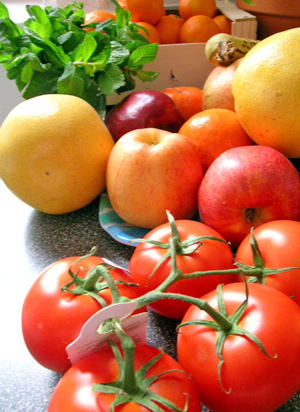For years, a collection of studies has grown suggesting that lycopene, the red carotenoid pigment found in such vegetables and fruits as tomatoes and papaya may be linked to a decrease in prostate cancer risk or advancement.
The studies all reveal the same lesson: diets high in the antioxidant lycopene may be protective against prostate cancer. Lycopene is found naturally in plant products such as fruit and vegetables. Fortunately, it is easy to spot because it gives the tomato and other foods their red color. The redder the fruit or vegetable is, the more lycopene it contains. Minor sources include light pink fruits such as watermelon, papaya, pink grapefruit, guava, and rosehips, while the largest source of the antioxidant is bright red tomatoes.

Not a fan of plain tomatoes? Just look for tomato based products such as ketchup, tomato paste, pasta sauce, V-8 tomato juice, or tomato soup. Processed tomato products are actually providing a more bioavailable source of lycopene which means it is more readily available for your body to use. In addition, this antioxidant is fat soluble, meaning oils aid in its absorption. So when you roast tomatoes brushed with olive oil and basil you’re not only improving flavor, but also improving your body’s ability to take up and utilize the nutrient.
Why is lycopene so important? It protects and repairs our cells by absorbing cancer causing free radicals, the dangerous molecules that float around in our body as a result of bad foods and the environment. The cancer protection may not come just from the lycopene though, as studies have shown greater benefits from consuming the actual tomato as opposed to just a supplement. This may be a result of the other components available in tomatoes, such as vitamins A & C, potassium, fiber, and a handful of other carotenoids.
Here's what the studies say:
- A study of 966 cases of European men with prostate cancer as well as 1,064 control subjects was followed for 6 years then compared for risk of prostate cancer. The results showed that lycopene levels were inversely correlated with risk of developing the cancer.
- Another study showed a decrease in Prostate Specific Antigen (PSA- a marker of prostate cancer) level when supplemented with 15 mg of lycopene daily for 6 months. In the placebo group, there was no growth of the prostate or change in PSA levels.
- A third study showed that those with prostate cancer who received a lycopene supplement had a stabilized PSA count as compared to a non-lycopene group. The study continued to show the same results at the 6 month, as well as the 2 year mark. This indicates that lycopene may slow the progression of PSA, and thus prostate cancer.
- A group of scientists for the American Institute of Cancer Research reviewed over 4,000 trials, studies, and reports to create their second expert report titled Nutrition, Physical Activity, and the Prevention of Cancer: A Global Perspective, and found “substantial and convincing evidence that foods containing lycopene probably protect against prostate cancer”.
It has been suggested that achieving a beneficial effect from tomatoes would be as easy as consuming two to three servings per week while no negative effects from regular tomato consumption has been noted.
What is your favorite way to cook up tomatoes and incorporate them into your diet?
References
Bunker C, McDonald A, Evans R, Rosa N, Boumosleh J, Patrick A. A randomized Trial of Lycopene Supplementation in Tobago Men with High Prostate Cancer Risk. Nutr & Cancer, 2007; 57(2):130-137
Heinz Food Service. Lycopene Q & A. Available at: www.lycopene.org. Accessed March 4, 2009.
Key T, Appleby P, Allen N, Travis R, Roddam A, Jenab M, Egevad L, Tjonneland A, Johnsen N, Overvad K. Plasma carotenoids, retinol, and tocopherols and the risk of prostate cancer in the European Prospective Investigation into Cancer and Nutrition study. J Clin Nutr. 2007; 86:672-81.
Liu X, Allen J, Arnold J, Blackman M. Lycopene inhibits IGF-I signal transduction and growth in normal prostate epithelia cells by decreasing DHT modulate IGF-I production in co-cultured reactive stromal cells. Carcinogenesis. 2008; 28 (4): 816-823.
Palmer, S. Can Tomatoes Slice Prostate Cancer Risk? Today’s Dietitian. 2012; 14 (6): 20.
Schwarz S, Obermuller-jevic U, Hellmis E, Koch W, Jacobi G, Biesalski H. Lycopene Inhibits Disease Progression in Patients with Benign Prostate Hyperplasia. J Clin Nutr, 2007; 138: 49-53
Vaishamapayan U, Hussain M, Banerjee M, Seren S, Sarkar F, Fontana J, Forman J, Cher M, Powell I, Pontes J, Kucuk O. Lycopene and Soy Isoflavones in the Treatment of Prostate Cancer. Nutr & Cancer, 2007; 59(1): 1-7.
Van Breemen R, Pajikovic N. Multi-targeted therapy of cancer by lycopene. Cancer Letters, 2008; 269 (2): 339-351.
American Institute for Cancer Research. Foods that Fight Cancer? Tomatoes. Available at: http://preventcancer.aicr.org/site/PageServer?pagename=foodsthatfightcancer_tomatoes . Accessed July 2012.




